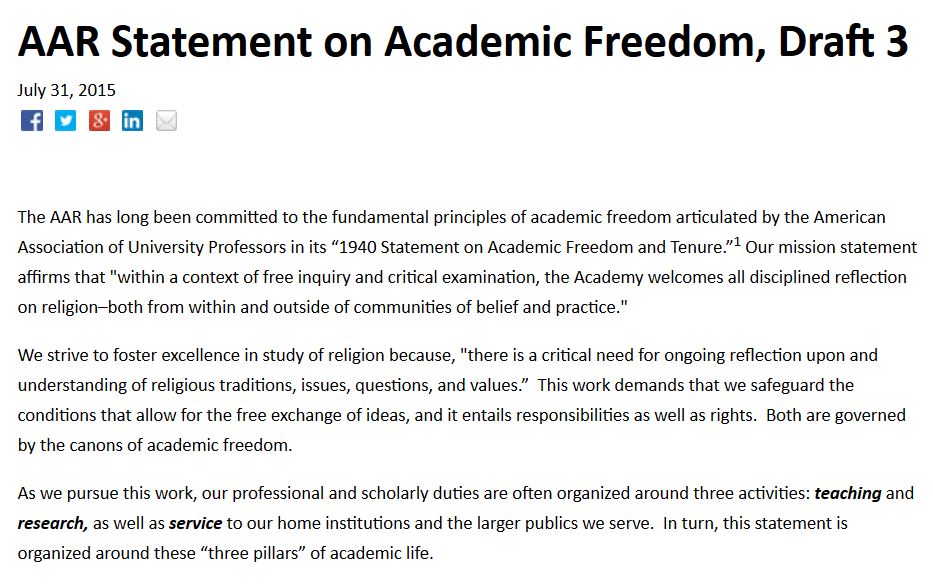 Recently, the Board of Directors of the American Academy of Religion released a draft update to its 2006 statement on Academic Freedom and the Teaching of Religion and solicited feedback from members. Given that the members of Culture on the Edge are all scholars of religion, some have opted to offer their feedback to the AAR via this short series of posts on our site. (An index to all the posts in this series can be found here)
Recently, the Board of Directors of the American Academy of Religion released a draft update to its 2006 statement on Academic Freedom and the Teaching of Religion and solicited feedback from members. Given that the members of Culture on the Edge are all scholars of religion, some have opted to offer their feedback to the AAR via this short series of posts on our site. (An index to all the posts in this series can be found here)
Craig Martin
I’m extremely grateful to the AAR for including reference to the AAUP’s statement on collegiality; the requirement of collegiality and civility are potentially directly opposed to academic freedom. However, as Merinda Simmons noted earlier in this series, there appears to be a tension between those comments on collegiality and civility, on the one hand, and the recommendation that we be respectful, sensitive, patient, humble, and generous, on the other. The definitions of the former terms overlap largely with the definitions of the latter. Wikipedia—a good source of information about colloquial uses of words—reports that collegiality *involves respect* toward others. So we are to be respectful to others, but institutions cannot demand that we be respectful (i.e., collegial) toward others?
In addition, from a certain perspective there’s something exceedingly odd about the recommendation that we be respectful, sensitive, patient, humble, and generous: it suggests that there are folks out there recommending that we be disrespectful, insensitive, impatient, arrogant, and selfish. However, I know of no scholarly collective or institution for whom these principles are guidelines. On the contrary, “respect,” “sensitivity,” etc., are contested terms, much like “orthodoxy” and “heterodoxy”—the function of which those in our profession, above all others, should understand. It’s always someone else who is disrespectful, heterodox; these terms function as subjective accusations, not terms with objective criteria regarding their limits.
Insofar as what counts as respectful—much like “offensive”—is relative to the audience at hand, an absolute demand for respect in a context with a diverse audience would incapacitate us; with a diverse audience we are bound to offend someone, no matter what we say. I doubt anyone would deny this. I’m sure the representatives of the AAR would respond to this objection by saying, “of course, these cannot be absolute demands; they can only be taken so far.” However, once that point is allowed, it opens the question of how far they should be taken. And that’s a question for which this statement has no answer. Indeed: the fact that the limits to these values are contested but we don’t publicly address the contestation is what makes them simultaneously rhetorically useful and analytically problematic.
To reiterate: I’m excited to see mention of the AAUP’s criticism of the language of collegiality, but I hope the next iteration of the AAR’s statement will wrestle more with how and where this places limits on the demand for “respect.” What are we to do with values that cannot be unlimited but whose limits we haven’t outlined?
